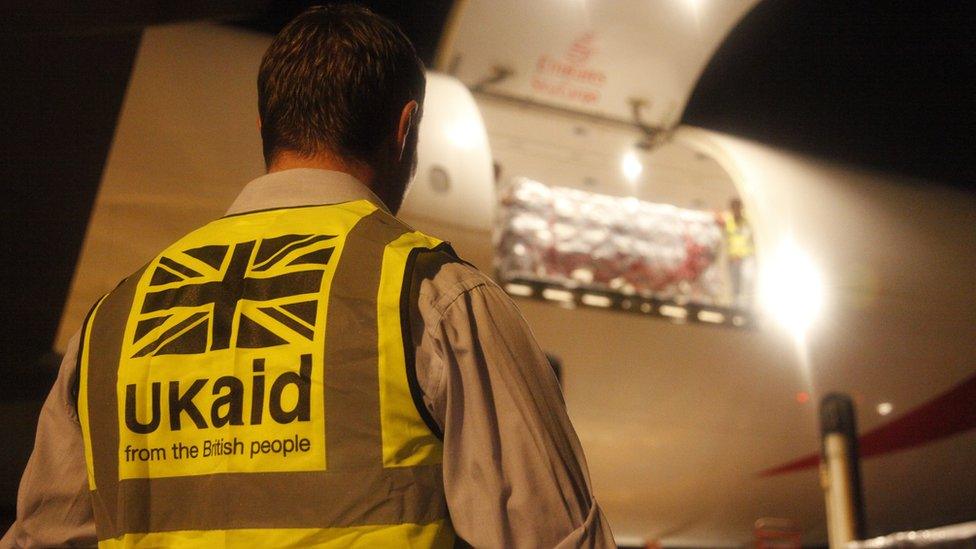Cut to UK's overseas aid budget 'not ruled out'
- Published

No 10 has not ruled out the UK failing to meet its commitment to spend 0.7% of income on foreign aid this year due to the financial crisis caused by Covid.
The pledge was enshrined into law by the coalition government in 2015.
Amid reports that spending could fall to 0.5% of income, Downing Street said the £15bn overseas aid budget was being reviewed to meet the UK's priorities and to provide value for money.
But one Conservative MP warned this would be a "retrograde step".
Spending on foreign aid is linked to the UK's gross national income, which has been badly hit by the pandemic.
The 0.7% target, initially proposed by the United Nations in the 1970s, was first adopted in the UK by Tony Blair's Labour government although it was was not actually reached until 2013.
The government has already announced a £2.9bn cut from the budget for the remainder of this year so as to avoid over-shooting the 0.7% target.


The fact the government is contemplating cutting the aid budget reflects, in part, a victory for the Chancellor Rishi Sunak.
Some Treasury officials have always disliked spending 0.7% of the nation's income on overseas assistance. They don't like the idea of cash being tied up in a budget they cannot control.
But the Treasury's victory - if indeed it does prevail in its battle with the Foreign and Development Office - would also reflect the sheer scale of the debt with which the nation's coffers are now burdened because of the Covid pandemic.
For that might be seen as the only justification for a decision that would be criticised by many as an act of self-harm.
Britain is one of the few countries that actually meets the United Nations' 0.7% target. The UK's reputation as an aid superpower gives it clout on the world stage. It gets the UK onto international tables where otherwise it might not sit.
It is a symbol of soft power and global leadership that is the envy of many nations. Cutting international aid might not be a good look at a time when 100 million people are expected to be pushed into extreme poverty because of the pandemic.
The 0.7% target is legally binding so any failure to meet it would require the Foreign Secretary, Dominic Raab, to have to explain himself to the House of Commons and set out how he is going to meet the target next year.
Anything that smacks of government trying to avoid the spirit as well as the letter of the law could well be subject to judicial review in the courts.
Oh, and any cut would probably provoke yet another rebellion by Conservative MPs who might join with opposition parties to resist the change. So yes, the government could indeed cut the aid budget. But it would come at some reputational and political cost.

If the economy recovers next year, foreign aid spending will need to rise unless the government opts to temporarily ditch the 0.7% commitment.
Asked about a report in The Times, external that spending could fall to 0.5% of income, No 10 said there was provision in the 2015 International Development Act for circumstances in which the UK could not meet the 0.7% pledge
He said if that happened, ministers would be required under the terms of act to make a statement in Parliament on why the target had not been met.
'World's poorest'
He added: "The government is committed to supporting international development and helping the world's poorest people."
"We are looking at how the foreign aid budget is spent to ensure it serves the UK's priorities and represents value for money."
Earlier on Tuesday, Housing Secretary Robert Jenrick said it was "legitimate" to consider where savings could be made when public finances were under "huge strain".
Conservatives on the right of the party have long argued overseas aid budgets - which were protected from cuts under previous Tory prime ministers David Cameron and Theresa May - are wasteful and money should be re-directed to domestic priorities.
But other MPs have reacted with dismay to the reports. Sir Bob Neill said the UK's aid spending "promotes British values abroad and helps millions of the most vulnerable every year".
"A reduction to it, even temporary, would be a retrograde step that diminishes our international clout, precisely when we need to be firing on all cylinders post-Brexit," he wrote on Twitter.
Public borrowing has spiralled this year as the government has intervened in unprecedented ways to support businesses and jobs through the pandemic.
Chancellor Rishi Sunak has said the nation's finances will need to be rebalanced over the medium-to-long term, although he has given little detail about how he plans to do this.
In a letter to MPs in July, he said the UK's aid strategy would remain focused on poverty reduction and the UK's other strategic priorities, including tackling climate change and championing girls' education.
The aid budget is now overseen by the Foreign, Commonwealth and Development Office - following the Department for International Development's merger with the Foreign Office in September - and is part of an Integrated Review of foreign and defence policies currently being undertaken.